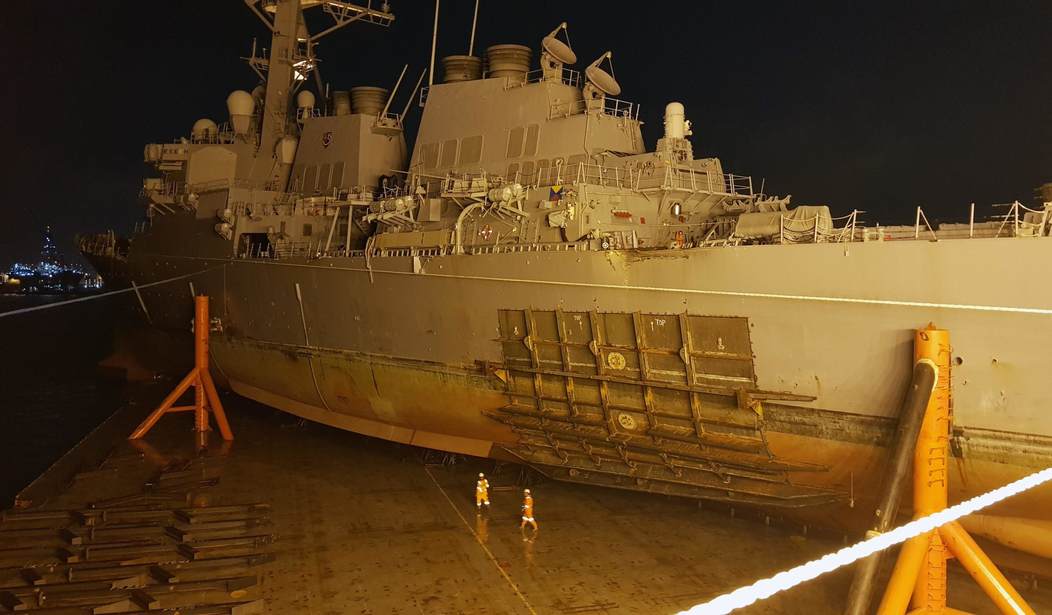ARLINGTON, Va. — The chief of naval operations said a review of recent deadly collisions in the U.S. fleet pinned the blame on human error, in a department “run hard in the past 16 years of war” that “if we’re not careful, we can become overstretched, overextended.”
Adm. John Richardson told Pentagon reporters today that “if we take our eye off the fundamentals, we become vulnerable to mistakes at all levels of command.”
Ten sailors died in August when the Alnic MC, a Liberian-flagged 600-foot oil and chemical tanker, collided with the USS John S. McCain as it was heading to Singapore for a routine port visit.
The Navy launched an investigation into that collision and others this year in the Pacific, including the USS Fitzgerald colliding with a Philippine-flagged cargo ship southwest of Japan in June; seven sailors were killed.
The review found the USS John S. McCain incident was caused by confusion over which console on the bridge had steering control. “The CO had only ordered speed control shifted. Because he did not know that steering had been transferred to the Lee Helm, the Helmsman perceived a loss of steering,” the report stated.
“In the course of 3 minutes of confusion in a high traffic sea channel, the McCain was in irreversible trouble,” and efforts to correct course were too late to avoid crossing paths with the oil tanker. Neither ship sounded five short whistle blasts to warn of danger or communicated with the other before the collision.
“I’ll be clear, these accidents were preventable,” Richardson said. “The causes for the collisions included a failure to plan for safety, failure to adhere to sound navigational practices, failure to execute basic watchstanding principles, failure to properly use available navigation tools, failure to respond deliberately and effectively when in extremist of collision, a loss of situational awareness and high traffic density, failure to follow the international rules of the road and for John S. McCain, insufficient knowledge and proficiency of the ships steering system.”
The admiral said some “immediate actions” have been taken in response, including “restoring a deliberative scheduling process in the 7th Fleet, conducting comprehensive ready for sea assessments for all Japan-based ships, establishing the Naval service group in the Western Pacific an independent body in Yokosuka, Japan, that will keep their eye on readiness generation and standards for the Pacific Fleet Commander, establishing and using a near-miss program to understand and disseminate lessons learned, and establishing policies for surface ships to routinely, actively transmit on their automatic identification system.”
The Navy will also be “reviewing the qualification standards, establishing comprehensive policies on managing fatigue, revising readiness-assessment standards, aligning the operational requirements to available resources, and accelerating some of the electronic navigation systems upgrades.”
Longer-term remedies, Richardson said, will include “improving individual and team training skills with an emphasis on basic seamanship, navigation and integrated bridge equipment, evaluating core officer and enlisted curricula with an emphasis on fundamentals, navigation skills.”
Richardson said he ultimately feels responsible for the errors mistakes that led to the loss of so many sailors, but said he can maintain the confidence of the fleet.
As fatigue “did play a role” in the incidents, sailors were recently mandated to get six to eight hours of sleep per 24-hour cycle.
“We found that the commander officers were at fault, the executive officers were at fault. There were watchstanders on the ships. And we’ve been pretty clear about identifying where there was fault and taking appropriate accountability actions, up to and including the 7th Fleet commander,” Richardson said. “…What happened was a gradual erosion of the margins of safety. And so, when the system has that and you get this reduced margins of safety, you combine that with a stressful situation then you’re much more vulnerable — you’re much more vulnerable to that.”
Senate Armed Services Committee Chairman John McCain (R-Ariz.) said after a briefing on the report Tuesday that “time is of the essence in fixing the problems, and Congress must provide the necessary resources in a timely and predictable manner.”
“The failure to properly fund, train, and equip our military directly contributed to these collisions,” McCain said. “The Senate Armed Services Committee will continue to conduct close oversight of the Navy’s efforts to correct deficiencies in order to ensure tragedies like these do not happen again.”
Said House Armed Service Committee Chairman Mac Thornberry (R-Texas): “These deaths were entirely avoidable had Pentagon leadership in recent years heeded the warning signs in time, taken the appropriate actions, and been honest with themselves and the country about the readiness challenges they face.”









Join the conversation as a VIP Member